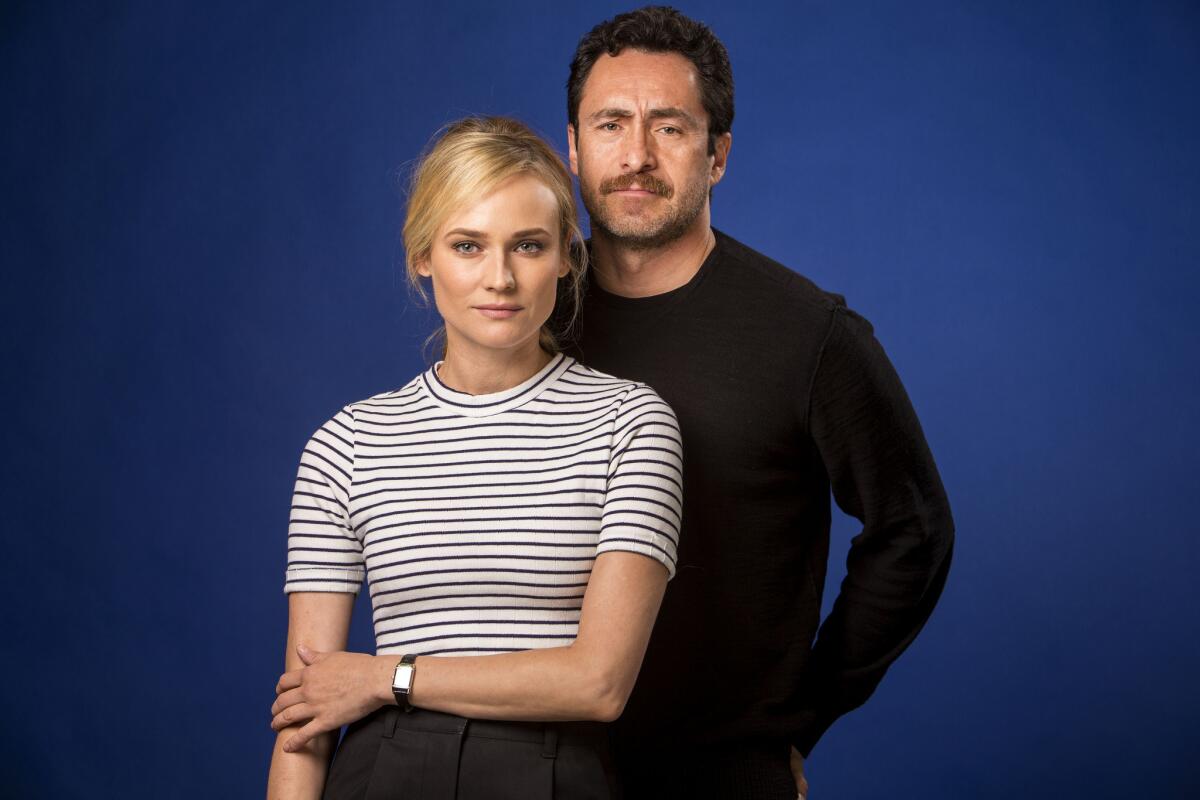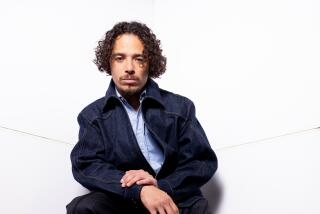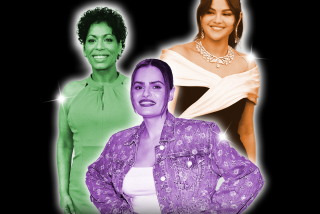‘The Bridge’s’ Demian Bichir prizes his time in the gray zone

Demián Bichir is an actor who likes to work in the shades of life. A prolific star in his native Mexico, the 50-year-old Bichir has steadily left a dent across the border in Hollywood on film and TV, earning a lead actor Oscar nod for his role in 2011’s immigrant worker drama “A Better Life.” The television-inclined might remember him for his three-season stint on Showtime’s “Weeds” as the crooked mayor of Tijuana and beau to Nancy Botwin (Mary-Louise Parker).
But it’s his role on FX’s gritty crime saga “The Bridge,” which returned for a second season last week and whose subtext lies in the tensions between the U.S.-Mexico border, that has him seeing gray in a new light. He plays psychologically tortured Mexican detective Marco Ruiz, who works with an El Paso detective (Diane Kruger) to solve each season’s central mystery. Executive produced by Elwood Reid and Meredith Stiehm, the show is based on the Danish-Swedish series “Bron.”
How was it getting back in the mind-set for this role? You’ve done multiple seasons on “Weeds,” but is it a bigger adjustment when you’re front and center?
It’s a funny thing because I’ve never done sequels to films. So for me, I’m used to doing a job, going home, then forgetting about it. I’m not used to having a second round of this or that. I did once in Mexico, we did this series where my character was a good cop, and we did a second round of that character. But to me this thing about doing it over and over again every year is a new thing. It is tricky because you can lose track of a character. It’s not an easy thing for me. I remember my first two weeks of this second season, I couldn’t find it. I looked in every drawer of my house. I couldn’t find it. I couldn’t find Marco in me — even though I had the script. And it terrified me.
So what do you do?
Panic. In film, I’m used to mourning the character after I’ve finished. It’s a healing process after you kill that character.
Marco is someone who is trying to make a difference in a complicated environment.
That’s part of the beauty of him. It’s a big challenge because you have so many obstacles constantly that you have to deal with. That’s what I love about a character like this. Marco is no angel. He has many different tonalities and many different layers of emotions and feelings and ways of thinking. That’s an interesting character for me. I don’t believe in black and white only. We’re not like that. We can be fantastic human beings and terrible ones in the same day.
Well, and we see bad decisions from his past catch up with him. The season ended with the serial killer targeting Marco’s family and ultimately killing his son. How will we see him coming to terms with that?
I think that’s one of the interesting things about Season 1 — how do you take that situation to the extreme of how much human beings are willing to kill in order to get even and hurt someone else? That’s evil. Falling in love with someone else is only nature. It’s life. Killing someone, that’s crossing the line. There’s a big, huge difference between the harm that Marco created and how that was perceived on the other side and how much they wanted to get even through killing, because Marco never killed anyone. The whole thing was an accident. It was bad timing.
I think no one wakes up in the morning thinking, “I’m going to do some harm.” There are some people who do, maybe. Marco is not one of them. And of course, when you go all the way down into this type of inferno, your life will not be the same again. Doesn’t matter how hard you try. You can recover from killing someone as part of your job. You can even recover from losing your wife, getting a divorce. But I don’t think anyone can recover from losing a child. The death of his son is not part of nature’s plan. It goes against nature’s laws. So Marco begins Season 2 in that very place. That is the darkest zone any character can be in. The interesting thing about Season 2 is how much Marco’s willing to honor his son’s death in trying to do the right thing and how much he will become very, very dangerous to the bad guys because he has nothing to lose anymore.
What was the reaction about taking on this project in terms of its portrayal of Mexico?
When this thing first started, all I had was the pilot. And that is why the names involved in the project are crucial, because you trust those names. One of the promises was Mexico would not be portrayed in a stereotype kind of way with Hollywood clichés and this and that. And it’s hard. It’s difficult. Asking Hollywood to stay away from stereotypes and clichés is challenging. And I think we have achieved a couple of interesting points, agreements, but we still have to work hard with some others. The problem isn’t having corrupt cops or drug kingpins — it’s how you explore the undertones of those kind of characters.
I’m not an ambassador for Mexico’s greatness. I think Mexico is great because Mexico is great. We have our own issues, our own problems. But I’m not an actor because I’m only willing to portray heroes. If we’re telling narco stories, violence stories, corruption stories, it’s because we create those stories; we read about those stories every day in real life. Do we have our good sides? Yes, we do. We’re fantastic people. That is exactly the part we want to take care of. I’m not interested in telling a story where everyone is crooked, all the women are whores and everything is wrong in Mexico. I’m interested in telling both sides of the coin, and I’m interested in talking about everyone’s problems, not only Mexico’s.
You’ve been outspoken about immigrant issues — and you’re a former undocumented immigrant. What are your thoughts on where things stand now?
What really needs to happen is education. There’s a lot of misinformation out there, and that creates fear, that creates panic. The American people need to seek out the real facts, not just take what politicians are feeding them because they’re branding these hardworking people as the villain. Are we blind? Don’t we see that they move this country, they move our economy, they make our lives better and easier? It’s stupid. We’re shooting ourselves in the foot. There needs to be an end to deportations. And so what needs to happen is people need to question President Obama on where is the immigration reform that was promised. Where is it? This can’t just be viewed as a political issue. It’s a human issue. Families are being ripped apart. That’s why I talk about it everywhere. I want to be an ambassador for this issue, to be a voice for those who aren’t being heard.
“The Bridge,” much like FX’s other drama “The Americans,” isn’t afraid to do entire scenes in another language. And it’s not something we see all the time. Were you surprised by how much it’s been embraced for storytelling purposes?
Can you imagine if I’m from Ciudad Juarez and I’m in bed with my wife who is also from Ciudad Juarez and I’m speaking English? That would be totally unrealistic. And yet not everyone takes that step — we see shows shy away from it all the time. FX call themselves fearless.
You’re a household name in Mexico. Here in the U.S., you’ve mentioned being mostly known for “Weeds.” How has that changed?
I love being anonymous. Every time I travel to a country where no one has any clue, that’s my happiest time. I nurture my acting from observing. And if people know you, you become the observed. There’s nothing I enjoy more than just sitting outside a cafe and see life walking by right in front of me. I love human behavior. I guess Brad Pitt can’t do that.
More to Read
The complete guide to home viewing
Get Screen Gab for everything about the TV shows and streaming movies everyone’s talking about.
You may occasionally receive promotional content from the Los Angeles Times.







